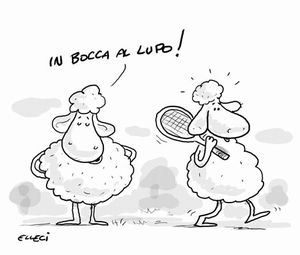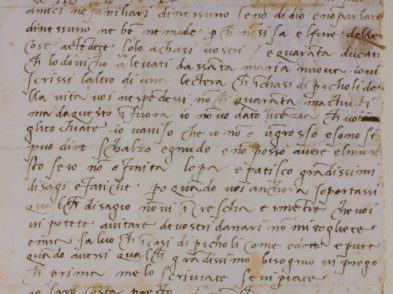In Italy, it is good luck to touch iron. Knocking on wood will do nothing for you. It is also good luck to touch the hump of a hunchback or stroke the nose of a wild boar. Fortune will also smile kindly upon you if you jump when you see a priest or play 98 on the lottery wheel after you dream of a dead relative. I am told that rain on your wedding day is really good too.
It also may be useful to know that in Italy, it is considered extremely bad luck to wish someone good luck in the literal way by saying buona fortuna. The lucky way to wish good fortune is to say in bocca al lupo, which can be translated as “into the wolf’s mouth.” Similar to the English expression “break a leg,” the “in bocca al lupo” metaphor compares any challenging scenario to being caught between the hungry jaws of a wild beast whose aim is to swallow both the misfortunate and the careless. The “wolf” may be a teacher who wants to fail you, a critical audience before a presentation at work, or simply symbolize having to overcome any excruciatingly difficult enterprise. (And yes, buying a stamp and a light-bulb in the same morning can be classified as an excruciatingly difficult enterprise in Italy.) I’ve learned a lot of lucky things in my Italian life, but sometimes bad luck comes along when it shouldn’t.
My first year at the Università degli Studi di Venezia, I stood in line for an oral exam on Medieval History. Things appeared to be going considerably well. We were only half an hour past the scheduled exam time and, according to reliable sources, the professor was actually somewhere on the premises. Where exactly, nobody knew. There were roughly a dozen of us waiting for him in silence as if we were third graders in line for confession, trying to think of what to say to the priest. The sentiment was actually quite apropos, because our classroom was part of a desecrated church, now used for city council meetings and higher education. Dott. Cacciari spoke where the altar used to be, and from my classmate’s expressions at least half wished it were still a place of prayer. A girl I had seen wearing a fur coat to lecture several times that term smiled and offered me a toffee, so naturally I forgave her for her cruelty to animals. We started to chat. “It’s supposed to be a really tough exam,” she said, “So in bocca al lupo.”
“Grazie,” I smiled.

In response, the fur-coat girl gave me a pained look and took a step back. Thanking someone for wishing you good luck is the surest way to earn yourself really bad luck. The appropriate response to “in bocca al lupo” is “Crepi lupo” or “May the wolf die.” But what if you are distracted and worried about getting toffee off your teeth before your turn? What if you forget to issue the death threat?
“Ora ti sei messa in un vero pasticcio!
You’ve gotten yourself into a real pasticcio now!” another of my classmates whispered. As you probably know, a pasticcio is a giant lasagna that women traditionally make with fresh pasta for Sunday dinner. It is also a synonym for serious trouble. Admittedly, there are occasions when getting trapped in a delicious giant lasagna doesn’t sound like such a punishment. This was not one of those times. The thought of pasticcio did not appeal to the butterflies in my stomach, especially if I was supposedly swimming in it.
By the time the professor arrived, I was a nervous wreak. Studente numero uno stepped hesitatingly into the examination room and emerged fifteen minutes later looking like he had just been to the dentist’s. I was studente numero due. With resignation, I sat across from Cacciari and awaited my fate. “Speak to me of the major forces that influenced Medieval literature,” he said.
I spoke of the role of superstition, powerlessness and questions of free will. I explained the concept of man’s destiny being dictated by unknown forces and the whims of Fate and Fortune. When I got to the part about man’s struggle for knowledge against all odds, I started to get emotional. Fortunately for me and history, that undercurrent gave birth to the Renaissance Man.
When I left the testing room, and emerged victorious from the beast’s belly I wasn’t wearing lasagna. I was wearing a big smile. You might say I was one lucky Little Red. My exam had gone well. And the wolf? That bad old lupo was good and dead.








